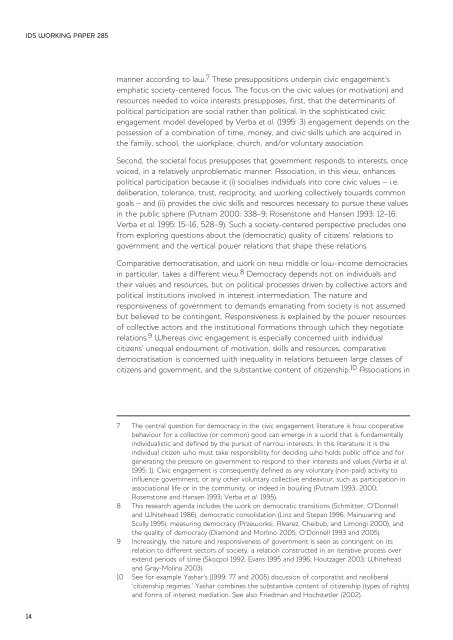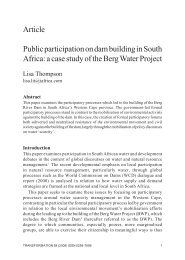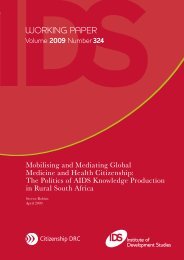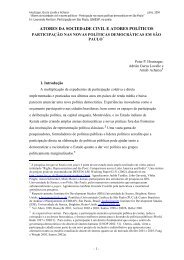IDS WORKING PAPER 285manner according to law. 7 These presuppositions underpin civic engagement’semphatic society-centered focus. The focus on <strong>the</strong> civic values (or motivation) <strong>and</strong>resources needed to voice interests presupposes, first, that <strong>the</strong> determinants <strong>of</strong>political participation are social ra<strong>the</strong>r than political. In <strong>the</strong> sophisticated civicengagement model developed by Verba et al. (1995: 3) engagement depends on <strong>the</strong>possession <strong>of</strong> a combination <strong>of</strong> time, money, <strong>and</strong> civic skills which are acquired in<strong>the</strong> family, school, <strong>the</strong> workplace, church, <strong>and</strong>/or voluntary association.Second, <strong>the</strong> societal focus presupposes that government responds to interests, oncevoiced, in a relatively unproblematic manner. Association, in this view, enhancespolitical participation because it (i) socialises individuals into core civic values – i.e.deliberation, tolerance, trust, reciprocity, <strong>and</strong> working collectively towards commongoals – <strong>and</strong> (ii) provides <strong>the</strong> civic skills <strong>and</strong> resources necessary to pursue <strong>the</strong>se valuesin <strong>the</strong> public sphere (Putnam 2000: 338–9; Rosenstone <strong>and</strong> Hansen 1993: 12–16;Verba et al. 1995: 15–16, 528–9). Such a society-centered perspective precludes onefrom exploring questions about <strong>the</strong> (democratic) quality <strong>of</strong> citizens’ relations togovernment <strong>and</strong> <strong>the</strong> vertical power relations that shape <strong>the</strong>se relations.Comparative democratisation, <strong>and</strong> work on new middle or low-income democraciesin particular, takes a different view. 8 Democracy depends not on individuals <strong>and</strong><strong>the</strong>ir values <strong>and</strong> resources, but on political processes driven by collective actors <strong>and</strong>political institutions involved in interest intermediation. The nature <strong>and</strong>responsiveness <strong>of</strong> government to dem<strong>and</strong>s emanating from society is not assumedbut believed to be contingent. Responsiveness is explained by <strong>the</strong> power resources<strong>of</strong> collective actors <strong>and</strong> <strong>the</strong> institutional formations through which <strong>the</strong>y negotiaterelations. 9 Whereas civic engagement is especially concerned with individualcitizens’ unequal endowment <strong>of</strong> motivation, skills <strong>and</strong> resources, comparativedemocratisation is concerned with inequality in relations between large classes <strong>of</strong>citizens <strong>and</strong> government, <strong>and</strong> <strong>the</strong> substantive content <strong>of</strong> citizenship. 10 <strong>Associations</strong> in7 The central question for democracy in <strong>the</strong> civic engagement literature is how cooperativebehaviour for a collective (or common) good can emerge in a world that is fundamentallyindividualistic <strong>and</strong> defined by <strong>the</strong> pursuit <strong>of</strong> narrow interests. In this literature it is <strong>the</strong>individual citizen who must take responsibility for deciding who holds public <strong>of</strong>fice <strong>and</strong> forgenerating <strong>the</strong> pressure on government to respond to <strong>the</strong>ir interests <strong>and</strong> values (Verba et al.1995: 1). Civic engagement is consequently defined as any voluntary (non-paid) activity toinfluence government, or any o<strong>the</strong>r voluntary collective endeavour, such as participation inassociational life or in <strong>the</strong> community, or indeed in bowling (Putnam 1993, 2000;Rosenstone <strong>and</strong> Hansen 1993; Verba et al. 1995).8 This research agenda includes <strong>the</strong> work on democratic transitions (Schmitter, O’Donnell<strong>and</strong> Whitehead 1986), democratic consolidation (Linz <strong>and</strong> Stepan 1996; Mainwaring <strong>and</strong>Scully 1995), measuring democracy (Przeworksi, Alvarez, Cheibub, <strong>and</strong> Limongi 2000), <strong>and</strong><strong>the</strong> quality <strong>of</strong> democracy (Diamond <strong>and</strong> Morlino 2005; O’Donnell 1993 <strong>and</strong> 2005).9 Increasingly, <strong>the</strong> nature <strong>and</strong> responsiveness <strong>of</strong> government is seen as contingent on itsrelation to different sectors <strong>of</strong> society, a relation constructed in an iterative process overextend periods <strong>of</strong> time (Skocpol 1992; Evans 1995 <strong>and</strong> 1996; Houtzager 2003; Whitehead<strong>and</strong> Gray-Molina 2003).10 See for example Yashar’s (1999: 77 <strong>and</strong> 2005) discussion <strong>of</strong> corporatist <strong>and</strong> neoliberal‘citizenship regimes.’ Yashar combines <strong>the</strong> substantive content <strong>of</strong> citizenship (types <strong>of</strong> rights)<strong>and</strong> forms <strong>of</strong> interest mediation. See also Friedman <strong>and</strong> Hochstetler (2002).14
IDS WORKING PAPER 285this case are collective actors whose contribution to democracy is <strong>the</strong> (i) aggregation<strong>and</strong> representation <strong>of</strong> interests, (ii) <strong>the</strong> definition <strong>of</strong> <strong>the</strong> political identities <strong>and</strong>interests <strong>of</strong> less powerful social groups; <strong>and</strong>/or (iii) counter-balancing state power. 11Tilly <strong>and</strong> O’Donnell are, in distinct but complementary ways, developing <strong>the</strong> mostinsightful analysis <strong>of</strong> comparative democratisation that combines <strong>the</strong> political <strong>and</strong>civil dimensions <strong>of</strong> citizen-government relations. Their notion <strong>of</strong> democracy, whendefined at a high level <strong>of</strong> abstraction, is richer than that found in <strong>the</strong> proceduralminimum definition, yet does not trespass into areas <strong>of</strong> substantive outcomes. 12They highlight <strong>the</strong> importance <strong>of</strong> <strong>the</strong> equality in citizen-government relations, bothin <strong>the</strong> political <strong>and</strong> civil components <strong>of</strong> citizenship, <strong>and</strong> <strong>the</strong> link between this equality<strong>and</strong> what O’Donnell calls <strong>the</strong> democratic rule <strong>of</strong> law. Tilly (2004: 13–14) suggeststhat <strong>the</strong> expansion <strong>of</strong> government, <strong>and</strong> <strong>the</strong>refore points <strong>of</strong> contact betweencitizens <strong>and</strong> government, is an important part <strong>of</strong> democratisation when it occursalongside increases in ‘protected binding consultation' <strong>of</strong> citizens with respect togovernment personnel <strong>and</strong> policies – that is, <strong>the</strong> political component <strong>of</strong> citizenship– <strong>and</strong> in breadth <strong>and</strong> in <strong>the</strong> equality <strong>of</strong> relations between citizens <strong>and</strong> agents <strong>of</strong>government, <strong>the</strong> civil component. 13 O’Donnell <strong>and</strong> Schmitter (1986: 7) help specify<strong>the</strong> last, civil, part <strong>of</strong> Tilly’s definition by suggesting that democratic citizenshipinvolves ‘…<strong>the</strong> obligation <strong>of</strong> those implementing such choices to be equallyaccountable <strong>and</strong> accessible to all members <strong>of</strong> <strong>the</strong> polity.' Tilly’s idea <strong>of</strong> ‘breadth’suggests, on <strong>the</strong> one h<strong>and</strong>, an array <strong>of</strong> issues around which citizens enjoy rights <strong>and</strong>entitlements, <strong>and</strong> on <strong>the</strong> o<strong>the</strong>r <strong>the</strong> physical presence <strong>of</strong> government across nationalterritory to meet <strong>the</strong>se rights <strong>and</strong> entitlements. O’Donnell’s focus on accountability<strong>and</strong> access embeds this component into a notion <strong>of</strong> <strong>the</strong> democratic rule <strong>of</strong> law11 Cf. Schmitter (1974), Rueschemeyer, Stephens <strong>and</strong> Stephens (1992), Diamond (1999), Linz<strong>and</strong> Stepan (1996). As a st<strong>and</strong>ard concept <strong>of</strong> democracy <strong>the</strong> procedural minimum definitiondoes have analytic advantages as it facilitates comparison across regions <strong>and</strong> quantitativeanalysis using large data-sets. See for example Przeworski et al. (2000) <strong>and</strong> recent workthat constructs indices <strong>of</strong> democracy reflects this view (Munck <strong>and</strong> Verkuilen 2002; Bowman,Lehoucq <strong>and</strong> Mahoney 2005). In <strong>the</strong> minimalist definition, however, <strong>the</strong> political component<strong>of</strong> citizenship is compressed into competitive elections with broad franchise <strong>and</strong> <strong>the</strong> civilcomponent into protection <strong>of</strong> an important but sparse set <strong>of</strong> civil liberties. The mostinfluential statements in positive democratic <strong>the</strong>ory are <strong>of</strong> course Joseph Schumpeter’s(1947) <strong>and</strong> Robert A. Dahl’s (1971). See also Przeworski (1999) <strong>and</strong> for an insightful analysis <strong>of</strong>different procedural minimal definitions <strong>of</strong> democracy, Collier <strong>and</strong> Levitsky (1997). Rawls(1971) shows <strong>the</strong> limitation <strong>of</strong> a minimal concept <strong>of</strong> democracy <strong>and</strong> argues for an extensiveset <strong>of</strong> role for governments in a pluralist society.12 A number <strong>of</strong> o<strong>the</strong>r recent studies <strong>of</strong> democratisation have also exp<strong>and</strong>ed <strong>the</strong>ir focus onbinding consultation to include ei<strong>the</strong>r direct citizen participation <strong>and</strong>/or representation <strong>of</strong>particular publics by civil society organisations. On citizens participation in low <strong>and</strong> middleincome countries, see Chaudhuri <strong>and</strong> Heller (2002); Fung <strong>and</strong> Wright (2003); Dagnino (2002);Avritzer (2003 <strong>and</strong> 2004); Santos (1998 <strong>and</strong> 2002); Baiocchi (2001 <strong>and</strong> 2005). There arefew studies on political representation undertaken by civil society organisations in <strong>the</strong>se newinstitutional spheres, but see Gurza Lavalle et al. (2005a, 2006a <strong>and</strong> b) <strong>and</strong> Houtzager,Gurza Lavalle, <strong>and</strong> Castello (2005).13 By leaving <strong>the</strong> institutional mechanisms for binding consultation unspecified, <strong>the</strong> door isopen to new ‘participatory rights’ alongside those <strong>of</strong> representative democracy, such asrights to direct citizen participation or <strong>of</strong> group representation <strong>and</strong> societal control overpolicy processes by collective actors such as associations.15





